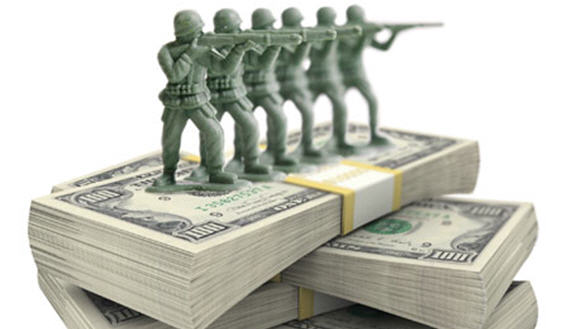The world is playing stud poker, whilst Europe plays bad chess. Last week’s stern warning from US NATO Ambassador Ivo Daalder that Europeans should use the money saved by withdrawing from Afghanistan to reverse crippling defense cuts was surely just another tiresome American whinge? In fact Daalder is dead right.
Daalder and I have not always seen eye to eye but he knows what he is talking about. Nor is he just another gung-ho American. Born in The Hague he is as European an American as one could possibly find and by and large sympathetic to the idea of a ‘Europe’.
The facts speak for Daalder. Last month’s authoritative “European Defense Trends” by Washington’s Center for Strategic and International Studies (CSIS) demonstrates conclusively a disconnection between Europe’s on-going slashing of defense spending and the hikes taking place in the rest of the world. According to CSIS European defense spending fell by 1.8% in 2012 on top of the up to 30% cuts from between 2008 and 2011. Contrast that with defense spending elsewhere revealed by my own research. Russia aims to inject about $775bn/€593 by 2022 for new armaments and a more professional military. Beijing grew the Chinese defense budget by 11.2% in 2012 (although slightly lower than the 12.7% in 2011) which is but the latest double digit increase. Indeed, China has been growing its military at that rate since 1989 and the official figures are probably ‘conservative’.
Even Europe’s overall defense spend conceals a dangerous capability gap BETWEEN Europeans. The combined 2011 defense budgets of NATO Europe totaled some $235/bn€180bn compared with a 2009 US defense budget of $658bn/€503bn, even though the size of the two economies is roughly the same. Of that $235bn/€180bn France and the UK together represent 49% whilst the so-called ‘big three’ (Britain, France and Germany) spend some 88% of all defense research and development in NATO Europe. Sixteen of the twenty-six NATO Europe members spend less than $5bn/€4bn per annum and much of it inefficiently. In spite of economic difficulties Britain plans confirmed spending of some $261bn/€200bn on military equipment alone over the next ten years.
It would be easy to say that Europe’s appeasement of strategic reality can all be put down to the Eurozone crisis. Clearly, that is an important factor. However, there are other deeper forces at work. When I worked on what became the EU’s Common Security and Defence Policy a decade or so ago there was still a sense that European defense would in time provide a new set of defense benchmarks wholly ‘made in Europe’, rather than imposed by America. Sadly, whilst the EU has indeed made limited progress towards a European defense market today those Euro-benchmarks are honored only in the breach. More than one senior EU official has told me privately that each time a force goal is missed EU member-states either move the goalposts, hide the facts or more often both.
America has some responsibility. Washington’s strategic mistakes and poor leadership have helped to create the pacifism from which much of Europe now suffers. However, ultimately Europeans must take responsibility for their own defense. Sadly, too many Europeans lack the appetite to create the big picture strategic analysis upon which sound strategic defense decisions are made. Consequently I can guarantee I will waste a lot of time this year at conferences listening to the same self-serving, short-term ‘strategic’ nonsense official Europeans serve up to justify defense meltdown. This will no doubt be supported by ‘evidence’ of meaningless deployments whilst reality-sapping national caveats and swingeing cuts will be quietly ignored.
Daalder’s essential point is therefore correct; one cannot establish a credible defense on a military vacuum. At a time when NATO’s collective defense architecture is in desperate need of modernization to cope with the technologies of a new age Europe cannot detach itself from geo-politics or pretend balance of power politics are a thing of Europe’s past. Like it or not Europe’s defense effort is a key test of European strategic seriousness. Europeans cannot expect Americans to invest in Europe’s twenty-first century defense if Europeans do not. Moreover, with an over-stretched America increasingly focused on Asia-Pacific Europe’s defense appeasement will drive dangerous world change not stop it. Sadly, lacking a strategic concept worthy of the name, mistrustful of American leadership and organized around a Germany the more influential it becomes the less military continental Europe will likely become more pacifist and more neo-isolationist.
What will it take for Europe to stop disarming? Europeans must stop appeasing reality by pretending they live in the Euro-world they would like and face the world as it is; a world in which others now make the rules. In other words, Europeans must stop playing bad chess, whilst the rest of the world plays stud poker. Winston Churchill once described an appeaser as “one who feeds a crocodile hoping it will eat him last”. If Europeans do not finally get their defense act together Churchill’s crocodile will one day bite…and hard!
Julian Lindley-French is Eisenhower Professor of Defence Strategy at the Netherlands Defence Academy, Fellow of Respublica in London, Associate Fellow of the Austrian Institute for European and Security Studies and a member of the Strategic Advisory Group of the Atlantic Council. He is also a member of the Academic Advisory Board of the NATO Defence College in Rome. This essay first appeared on his personal blog, Lindley-French’s Blog Blast.
Image: defense-spending.jpg
